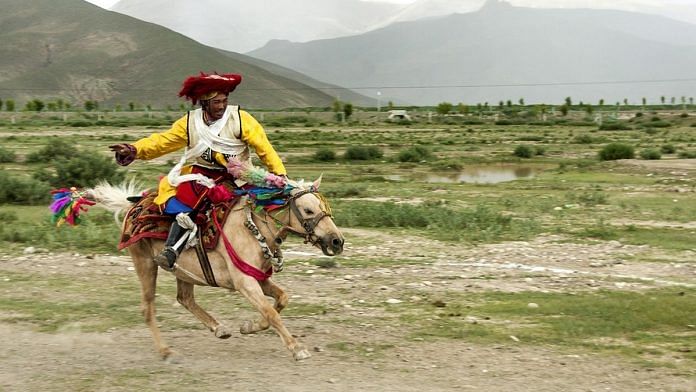New Delhi: China’s decision to make ‘ethnic unity’ mandatory in the Himalayan autonomous region through a legislation has led to concerns about it being anti-minorities.
According to a report in the Chinese newspaper Global Times, the decision was taken last Saturday by the People’s Congress of Tibet and it reflects the “significant role of unity in the region’s economic and social development”. The new law will come into effect from 1 May.
Global Times also stated that it was the “common responsibility for the people of all ethnic groups to safeguard national reunification, strengthen ethnic unity and take a clear-cut stand against separatism”.
At a session proposing this law, some local legislators also demanded that all ethnic groups must “protect, inherit and develop” Tibetan traditional cultures such as opera and thangka painting.
Penpa Lhamo, a deputy head of the Contemporary Studies Institute at the Tibet Academy of Social Science, was quoted saying: “This is the first legislation on ethnic unity at the autonomous region level across China.”
But soon after the law was passed, several experts raised concerns about how it could be used to justify crackdown on minority communities such the Uighurs. Four years ago, Beijing had adopted similar policies in the Xinjiang Uyghur Autonomous Region (Xuar).
The law, to build ‘harmony’ among ethnic communities, has also come at a time when Tibetans have consistently complained about the “suffocating” Chinese security system.
ThePrint takes a look at this new legislation and what it means for Tibet and the larger Chinese community.
Also read: Army chief Naravane must hold back on China border issue till Tibet is settled
‘To unify China’s sense of community’
A report has stated that the new law will hold government, businesses, community organisations, villages, schools, military groups and centres of religious activity responsible for imbibing ethnic unity.
The law also asks members of society to “integrate the ethnic unit into the management and culture of companies by recruiting employees of all ethnic groups”.
The legislation intends to “unify the Chinese nation’s sense of community,” said Lin Qingzhi, deputy secretary general of the Standing Committee of the Tibetan legislature.
A report has also stated that the Central Committee of the Communist Party of China had published a guideline to promote ethnic unity in October last year. This guideline emphasised on efforts to “improve the governance of ethnic affairs”, “guaranteeing legal rights” and “interest of citizens of ethnic groups”.
The report also claimed that there would be a crackdown on “criminal acts” that attempt to disrupt ethnic unity. It further been said that September would be the “designated month” for ethnic unity.
Also read: India-China border talks to focus on border management, says Beijing
‘Sinicisation of Tibetan plateau’
According to official figures put out by China in March 2019, Tibet’s population grew from 1.23 million in 1959 to 3.44 million in 2018. Tibetans account for 90 per cent of the population in Tibet.
Analysts have now argued that this legislation aims to curb the “growing resentment” against Beijing’s policies in Tibet. Since 2009, 156 Tibetans have “immolated” themselves in protest.
Senior journalist and Tibetologist, Vijay Kranti said, “This announcement is an indirect admission by the Communist Party of China that they have failed in integrating hearts of the people of Tibet into the overall Han identity of China.”
Amid fears that the ‘ethnic unity law’ mirrors regulations used to justify crackdowns in Xinjiang, T.G. Arya, the central tibetan administration secretary, minced no words to express disapproval of the legislation.
“What China could not achieve through the 60 years of occupation and repression, now they are trying to achieve through repressive law. The law aims to achieve complete sinicization of the Tibetan plateau through ethnic cleansing,” he said.
He also said that it was a “violation of international law and the Chinese Constitution to deny Tibetans of their proper identity”.
Sinicitisation is a term used to describe the process by which non-Chinese societies come under the influence of Chinese culture. Academics have used the term to “describe local adoption of religions imported from foreign regions”.
For instance, Buddhism slowly integrated into the Chinese culture “through a long history and was finally accepted as a Chinese religion”.
US Republican Senator Marco Rubio has also called out the Chinese government for this “potentially discriminatory law”. He said the Communist Party of China “continues its attempts to wipe out Tibetan culture” through this law.
Not the first time
This isn’t the first time, however, when a legislation to promote ‘ethnic unity’ has been passed. Four years ago, Xinjiang, which is a Chinese region housing the ethnic minority community of Uighars, had also passed a similar law.
Chinese authorities have also faced international criticism for detaining Uighur Muslims in camps, though China has always maintained that these are “re-education” camps, where detainees are offered “free vocational training”.
But documents leaked by the International Consortium of Investigative Journalists have revealed “systemic brainwashing” of thousands of Muslims in these camps.
Neighbouring provinces like Yunnan and Qunghai had also approved a similar legislation seeking ‘ethnic unity’ last year.
“Given the feverish preoccupation of China’s government these days to occupy the religious system and hierarchy of Tibet by imposing the next Dalai Lama of their choice after the present Dalai Lama passes away, this declaration is yet another attempt by Chinese government to make the world believe that the Tibetan people are happy under the their rule,” said senior journalist Kranti.
Also read: Infrastructure in Tibet gets a big boost as China stepped up focus after Doklam face-off




India must learn from Chinese Sinicization process and start it’s own Indianisation and Hinduisation process two deal with X mafia and Jihadists.
India must learn and also follow Indianisation and Hinduization as policy to combat the xian mafia and jihadists.